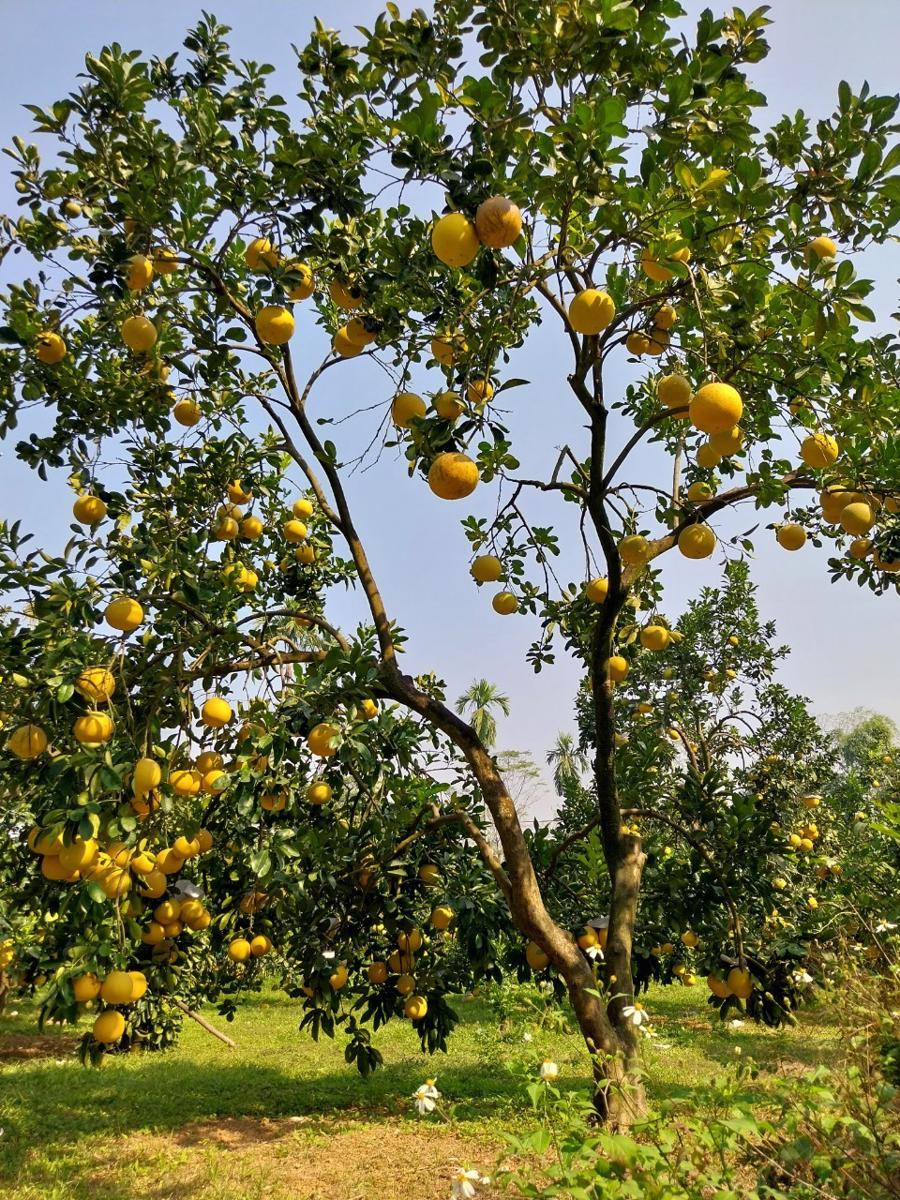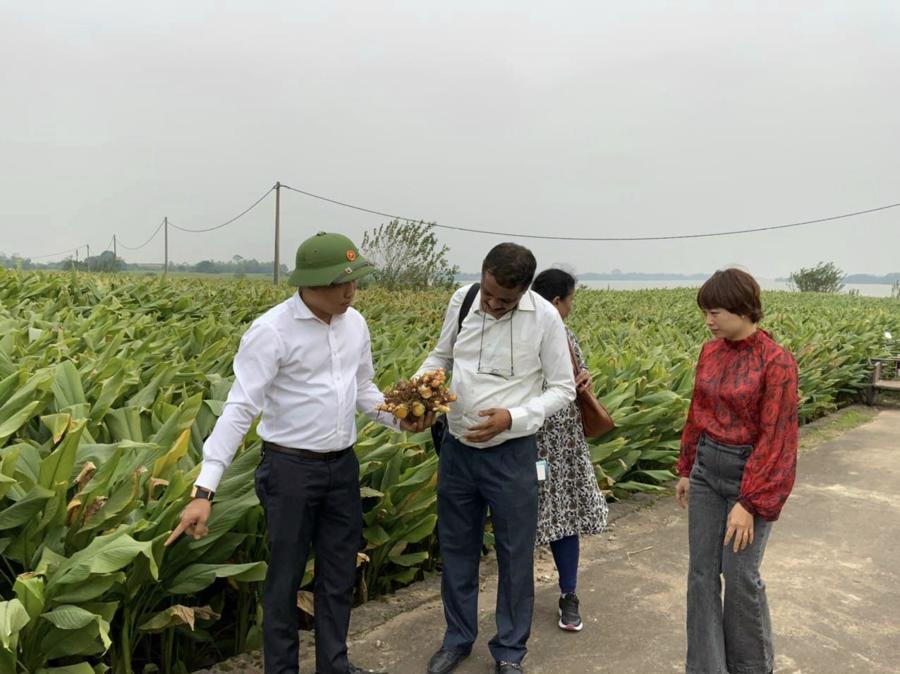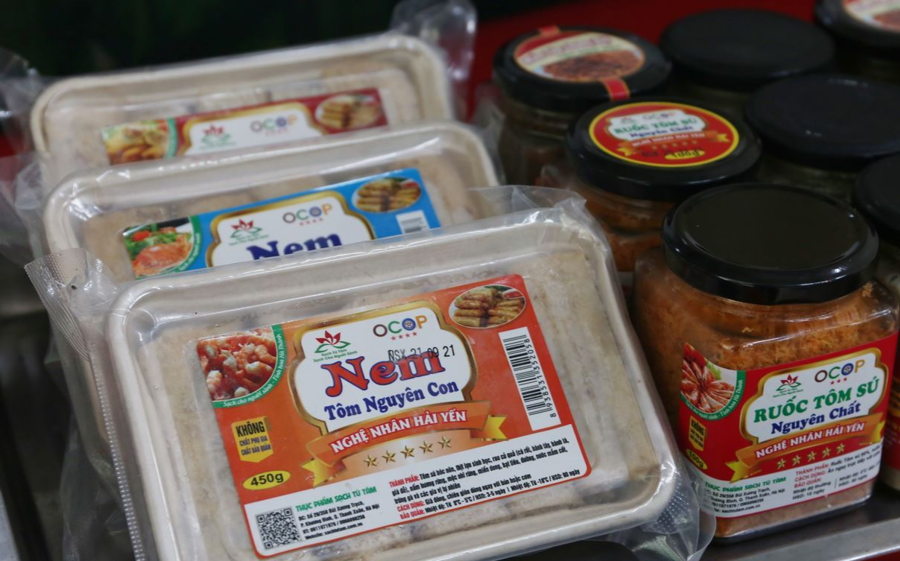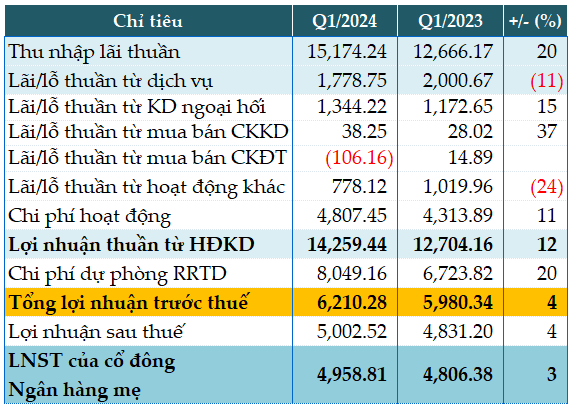Each OCOP product is a “culture ambassador” of a locality, reflecting the traditional cultural characteristics of a specific region, showcasing the traditions, customs, and lifestyle of the people. In the process of purchasing these products, consumers will gain additional information about the unique features of the raw materials, processing, production, and even the cultural and spiritual values.
ENHANCING QUALITY OF OCOP PRODUCTS
Particularly in the agricultural and food sector, one of the criteria for recognizing OCOP products is ensuring food safety and hygiene. This is also one of the strengths of these products. Le Huu Dinh, Director of the Clean Agriculture Cooperative in Duc Hau Luu Quang (Chuong My District), said that the cooperative’s Dien pomelo products have been evaluated, ranked, and recognized as 3-star OCOP products by the Hanoi City People’s Committee. To control the quality of the pomelo fruits, the cooperative has been producing them organically. The selected Dien pomelo products are carefully packaged in net bags, weighing from 800g to 1,200g, with traceable origin labels.
Similarly, Dinh Thi Hai Yen, Director of Tu Tam Clean Food Processing Trading Company (Thanh Xuan District, Hanoi), said that to ensure the quality of their OCOP products such as Giò (Vietnamese sausage), chả (Vietnamese pork pie), and nem (Vietnamese spring rolls), the company has focused on every aspect from production to processing, building the brand, labeling, and traceable origin. To enhance trust and meet the needs of customers, the company has invested in purchasing various types of machinery for the production process, such as large-capacity meat grinders, steam cookers, refrigerators, vacuum sealers, etc., to maintain the color, flavor, and ensure food safety.

Recently, the crispy fresh sấu (a type of fruit) of the individual business Quyen Luu in Phuong Chieu commune (Hung Yen city) has been certified with a registered trademark and rated as a 3-star OCOP product. Vu Van Quyen, the owner of the production facility, said that they have established a production process, provided guidance to households involved in growing sấu trees from caring to harvesting, and signed contracts with farmers for consumption. The purchased sấu fruits are classified, preliminarily processed, processed, and completed with packaging, then distributed to several agents both within and outside the province. The establishment of this distribution chain has ensured the production material supply for the family-based facility and meets the market demand.

In the meantime, the Hoang Minh Chau Hung Yen Co., Ltd. (Khoai Chau District), specializes in producing processed products from turmeric, such as turmeric powder, turmeric milk, nanocurcumin, turmeric starch, etc. The company has 5 OCOP products certified with 3-star and 4-star ratings. Hoang Quang Dong, the Director of the company, said that they place great emphasis on ensuring safety throughout the production process, from raw materials to finished products.
“Building the distribution chain contributes to raising the awareness, role, and responsibility of local households. The turmeric production area of the company and participating households is surveyed and evaluated for water and soil quality; the production process ensures hygiene and food safety to meet the conditions for exporting turmeric powder to countries like Japan and China,” Mr. Dong said.
EXPANDING MARKET CHANNELS
It can be said that the OCOP program has contributed to changing the lives of rural residents, creating new directions in the production and business of traditional specialties in favor of the province, as well as promoting large-scale and concentrated commodity production.
Currently, these products have been connected to large distribution systems nationwide such as Go!, MM Mega Market, Saigon Co.op, Winmart, Winmart+, etc. In addition, major distribution corporations such as Central Retail, AEON, Saigon Co.op have cooperated with the Ministry of Industry and Trade and localities to organize events to connect, promote, and consume OCOP products.
Furthermore, at rest stops along expressways and in sales areas at airports and tourist destinations, there are introduction and sales areas for OCOP products, contributing to serving the tourism industry and building a brand for the localities. However, there are still certain difficulties and limitations in the consumption of OCOP products, such as small-scale production, low business management capabilities of cooperatives and enterprises, etc. Therefore, the full value of the products and the spread of region-specific products to different market areas have not been fully realized.
At the recent “Connecting OCOP Product Consumption” conference, Bui Nguyen Anh Tuan, Deputy Head of the Domestic Market Department (Ministry of Industry and Trade), said that the ministry has developed criteria for introducing and selling OCOP products, and has provided funding and direct guidance and support to 25 localities in building OCOP introduction and sales points.
Some localities have used their own funds to establish OCOP product introduction points following specific criteria, with a unified standardized point identification system, such as Hanoi (over 85 OCOP product introduction points), Quang Ninh (30 points), Bac Kan (10 points), Ben Tre (12 points), Thanh Hoa (05 points), etc.

According to Hoang Hoa Quan, Deputy Head of the Tourism Management Division, National Administration of Tourism, Ministry of Culture, Sports and Tourism, tourists nowadays tend to find tours themselves on online applications and prefer to explore rural regions. This is an opportunity for OCOP products. However, he emphasized that tourists need to experience and witness the production process of local region-specific products. However, although there are more than 10,000 OCOP products in the country, the number of concentrated OCOP product points is still limited, especially those serving tourists.
In addition, experts believe that there is indeed a demand for using OCOP products by consumers, but it is the responsibility of relevant agencies to differentiate between certified OCOP products and “fake OCOP” products.
Furthermore, if these OCOP products are further consumed at traditional markets nationwide, it would not only increase income for farmers but also enhance the value of OCOP products and promote them everywhere. The key is that people will have more choices for clean, safe food products for daily consumption.









































